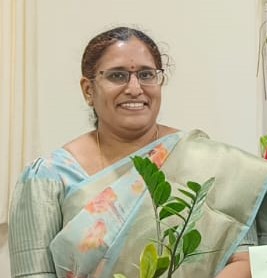
- Name : Prof. T. R. Jyothsna
- Designation : Head of Department
- Phone : 0891 2844833, 4832
- Email: head.eee@andhrauniversity.edu.in
PROFILE
Vision:To strengthen the department into a center of academic excellence with focus on advanced technology and inter-disciplinary research by delivering the best quality technical education to the students in meeting the current and future challenges with emphasis on moral and ethical foundation.
Mission:To create and enrich an environment with essential resources, so as to train and mould students to promote active learning, critical thinking and engineering judgment to solve real-world problems in the field of Electrical Engineering.
To motivate and strengthen faculty to instigate effective teaching learning process and advanced research and publication work.
To enhance industry interaction and provide reliable consultancy services.
The Department of Electrical Engineering was started in 1955 as one of the three constituents of the Department of Engineering in Andhra University. The status of a Department was given in 1969. The department has grown significantly and currently offers a UG program in Electrical and Electronics Engineering and PG programs in Power Systems & Automation and Control Systems Engineering.
The department initiated developmental activities in the emerging areas of CAD and Robotics with MHRD grants. The department has well established Machines, Networks, Measurements, Power Electronics, Microprocessor, Control system and Digital Electronics Laboratories. The department is periodically organizing refresher courses for APSEB practicing engineers. The department had undertaken consultancy projects in collaboration with NSTL. The teaching faculty of the department are involved in research activities in the areas of fault detection, power system stability, load flows, optimal power flows, modal reduction, decentralized fault detection and flexible AC transmission systems. The current focus of research is on Fuzzy logic and Neural Network Applications.
NAAC Presentation
Programs
| Sl.No | Name of the Program | |||
|---|---|---|---|---|
| UG Programmes | ||||
| 1 | B.Tech. Electrical and Electronics Engineering. | |||
| PG Programmes | ||||
| 1 | M.Tech. Power systems & Automation | |||
| 2 | M.Tech. Control Systems Engineering | |||
| Doctoral Programmes | ||||
| 1 | Ph.D in Electrical Engineering | |||
PROGRAMME EDUCATIONAL OBJECTIVES (PEOs)
- To provide the necessary background in the field of Electrical Engineering to deal with challenges in Engineering and Technology.
- To develop ability among students towards innovation and entrepreneurship that caters to the need of Industry and Society.
- To develop technical skill set for solving real life problems.
- To develop qualities like creativity, leadership, team work, and professional ethics for contributing towards the growth and development of society.
- To inculcate an attitude for life long learning.
PROGRAMME OUTCOMES (POs)
- PO1 Engineering knowledge- Apply the knowledge of mathematics, science, engineering fundamentals to real time electrical and electronics problems
- PO2 Problem analysis- provide solutions for EEE problems by Identify, formulate, review literature, analyze, designing and conducting experiments, interpreting and reporting the results.
- PO3 Design/development of solutions- Design and develop solutions for complex engineering problems at feasible and optimal solutions that meet the specified needs with appropriate consideration for the public health and safety, and the cultural, societal, and environmental considerations. Use research-based knowledge and research methods
- PO4 Conduct investigations of complex problems- including design of experiments, analysis and interpretation of data, and synthesis of the information to provide valid conclusions.
- PO5 Modern tool usage- select and apply appropriate techniques, resources, and modern engineering and IT tools including prediction and modeling to complex engineering activities with an understanding of the limitations.
- PO6 The engineer and society- Apply contextual knowledge to assess industrial, societal and safety related issues and understand consequent relevance to the professional engineering practice.
- PO7 Environment and sustainability- Understand the impact of the professional engineering solutions in societal and environmental contexts, and demonstrate the knowledge of, and need for sustainable development.
- PO8 Ethics- Apply ethical principles and commit to professional ethics and responsibilities and norms of the engineering practice.
- PO9 Individual and team work- Function effectively as an individual, and as a member or leader in diverse teams, and in multidisciplinary settings.
- PO10 Communication- Communicate effectively on complex engineering activities with the engineering community and with society at large, such as, being able to comprehend and write effective reports and design documentation, make effective presentations, and give and receive clear instructions.
- PO11 Project management- and finance Demonstrate knowledge and understanding of the engineering and management principles and apply these to one's own work, as a member and leader in a team, to manage projects and in multidisciplinary environments.
- PO12 Life-long learning- Recognize the need for, and have the preparation and ability to engage in independent and life-long learning in the broadest context of technological change.
PROGRAMME SPECIFIC OUTCOMES (PSOs)
- PSO-1 Graduates will be able to apply fundamental knowledge of Electrical & Electronics Engineering to identify, investigate and solve various real life electrical problems.
- PSO-2 Graduates will be able to design and develop systems in the emerging electrical and allied disciplines to meet out the industry challenges.
- PSO-3 Graduates will be able to contribute significantly in terms of Electrical Engineering innovations to support sustainable development of society with professional and ethical responsibilities.